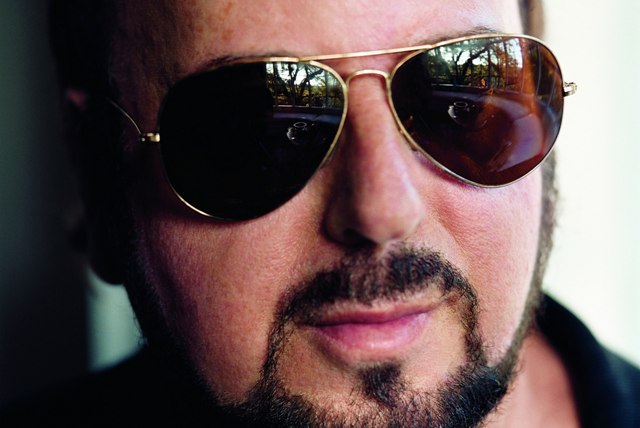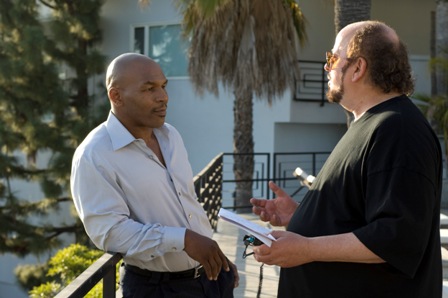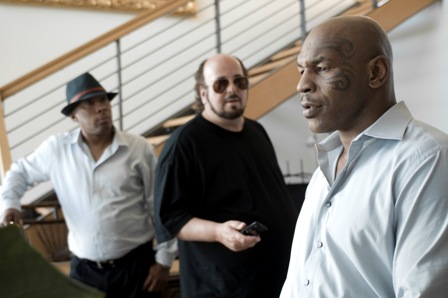CHICAGO – Patrick McDonald of HollywoodChicago.com appears on “The Morning Mess” with Dan Baker on WBGR-FM (Monroe, Wisconsin) on March 21st, 2024, reviewing the new streaming series “Manhunt” – based on the bestseller by James L. Swanson – currently streaming on Apple TV+.
Interview: Talking ‘Tyson’ With Writer, Director James Toback
CHICAGO – If you’re merely a casual movie goer, you may not know the name James Toback, but you probably know his work. If you do know the name, you probably have an opinion. The writer/director of films like “Fingers,” “Exposed,” “Bugsy,” “Two Girls and a Guy,” and “Black and White” has divided audiences and critics for years, but they all seem to be unanimous about his latest film, a startling, riveting, and brilliant examination of a fascinating man, “Tyson”.
In fact, the near-universal acclaim regarding what is essentially an hour-and-a-half self-portrait of the former boxer (the film uses no one’s words but Mike Tyson’s own) has surprised Toback.
“I’ve always had mixed response,” Toback told me on a rainy afternoon at the Peninsula Hotel. “I’ve always had people who really got [my movies] and were excited. And I’ve always had some vicious detractors. And then there’s been an in-between middle group. I assumed the same would be true here, particularly given Mike’s incendiary nature. I was shocked that there wasn’t more negative feeling and that he just overcame it and the movie got all the good stuff I was sure we’d get without any of the other.”

James Toback
Image credit: Brett Ratner, Courtesy of Sony Pictures Classics
That “good stuff” was generated by five days that Toback spent with Mike Tyson, three days in a rented house in the Hollywood Hills and two more walking on a beach north of Malibu. After amassing over 30 hours of interview footage, Toback went back and edited his film together with archival and fight footage from Mike’s legendary career in a daunting editing task he calls, with a smile, “a f**king nightmare.”
 James Toback and Mike Tyson Photo credit: Tracey Morris, Courtesy of Sony Pictures Classics |
Although every subject matter was on the table and the director had final cut, Toback didn’t ask traditional questions. He chose a “psycho-analytical” structure, which he says turned out to be the key. “Instead of face-to-face. I was a voice behind him, coming in at an angle, almost like a therapist and just triggering memories, which is what I was trying to do.”
Toback didn’t even employ an average interview structure from his analytical position, noting that he didn’t really ask questions. “I would raise subjects,” says Toback. “For instance, the first morning of the first day - “Earliest childhood memories.” An hour later - “What do you think about sex?” An hour later I could feel his curiosity over what is Toback leading me into. I would just play it straight, which I think is the best way to do it period, but certainly with someone who is fundamentally honest.”
Of course, Tyson is not your average heavyweight or your average movie subject. What’s most remarkable about “Tyson” is the subject of the film’s keen self-awareness and insight, something that Toback suggests may come from Mike’s unusual way with words.
He says, “I think he’s always had his own voice. He always had an almost physical sense of language. He says nothing in jargon. Everything is his flavored language. A lot of people only speak in jargon. They get phrases. They apply him here and apply them there. Athletes especially. Mike doesn’t have any of that. It’s all his fresh take on everything.”
The take of “Tyson” spends a lot of time on his very formative childhood. Even Toback was surprised at how open Mike was about those years and the fact that he was a childhood asthmatic. That condition instilled in Tyson a sense of fear that would impact his entire life.
 James Toback and Mike Tyson Photo credit: Tracey Morris, Courtesy of Sony Pictures Classics |
As Toback points out, “I had asthma when I was a kid. When you say you had trouble breathing, what you’re really saying is you were forced to deal with death or the fear of the death without having any preparation for it. When you’re lying there and you’re four years old or five years old and you’re gasping for breath, you don’t understand what’s going on. You just feel something very bad is about to happen. To overcome that…I don’t care whether the movie does phenomenally well or not well…when you have to overcome THAT, your whole life is going to be different. You can’t ignore that as the operating reality. It’s like having your head held under the water constantly. The panic that is clearly under the surface in Mike is the direct result of that sense of helplessness, his permanant danger to the integrity of the psyche.”
The fear instilled in Tyson due to several reasons examined in the film, perhaps none more prominent than his asthma, forced Tyson to become the man who would intimidate all others. How does one avoid fear? By striking it into everyone else.
Toback notes another crucial event in Tyson’s life when he says, “I think that the prison experience combined with the looming sense of panic based on his respiratory incapacity is the key to his whole personality. How do you overcome that? By becoming powerful, by intimidating people, and by saying, as he does, “I’ll never let anyone bully me ‘cause I would f**kin kill ‘em.” By letting the homicidal monster in you expand so you never again feel like the impotent, short, fat kid.”
Of course, no one is going to claim “Tyson” is a “balanced film”. It only presents Tyson’s side of the controversial moments in his life, including his relationship with Robin Givens, the rape charge, and the infamous ear-biting incident. But Toback is careful to note that the film is not an investigation.
“It’s not a documentary which tries to figure out,” Toback says. “First of all, you’re never gonna know anyway. About that or anything else. What happened to me this morning at breakfast? I tell you that I did this and I did that. Maybe I’m telling the truth. Maybe I’m not.”

Mike Tyson
Image credit: Larry McConkey, Courtesy of Sony Pictures Classics
Toback continues, “I’m not saying, “Here’s the truth.” I’m saying, “Here’s Mike Tyson’s vision of himself presented through my stylistic vision of him.” Richard Schickel wrote a great biography of Kazan. It was very well-researched. He talked to all sorts of people. Kazan wrote an autobiography. They’re different. There are some similarities but they’re too different books. The question is “Whose version of a life is going to be more interested? Kazan’s or Schickel’s?” Schickel’s will have more points of view. There is a virtue in that alone, but I would rather read, if I had a choice of two, Kazan’s version of his own life. No matter what digging Schickel did and no matter what insights he came up with that contradicted or supplemented Kazan’s, I would still rather have Kazan commenting on Kazan’s life. I would say that would be true of any figure in history.”
Mike Tyson even learned something about himself watching the film. Toback related two great lines of Mike’s about the movie that bears his name. After the first screening, Tyson said, “It’s like a Greek tragedy and they only problem is that I’m a subject.” Perhaps even more insightfully, Tyson said to Toback after Sundance, “People always used to say they were afraid of me and I wondered, ‘Why? What are you afraid of? Why would people be scared of me?’ Watching the film tonight I realized that I’m scared of that guy.”
See for yourself when “Tyson” opens in Chicago theaters this Friday, May 1st, 2009.
 | By BRIAN TALLERICO |


